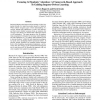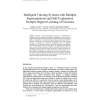13 search results - page 1 / 3 » Learning from Erroneous Examples: When and How Do Students B... |
ECTEL
2010
Springer
13 years 4 months ago
2010
Springer
We investigate whether erroneous examples in the domain of fractions can help students learn from common errors of other students presented in a computer-based system. Presenting t...
FLAIRS
2006
13 years 6 months ago
2006
Research indicates that impasse-driven learning can have important benefits for improving student mastery of material. When students recognize gaps in their understanding of a con...
IIE
2007
13 years 5 months ago
2007
How do we teach children to express and communicate ideas in a formal and informal mode? What type of language do they need in a concrete context? How should they determine a prope...
AIED
2009
Springer
13 years 12 months ago
2009
Springer
In this paper, we discuss how Artificial Intelligence (AI) techniques might be brought to bear in automatically recognizing “creative reasoning” in student e-discussions. An AI...
AIED
2009
Springer
13 years 12 months ago
2009
Springer
Although a solid understanding of fractions is foundational in mathematics, the concept of fractions remains a challenging one. Previous research suggests that multiple graphical r...


